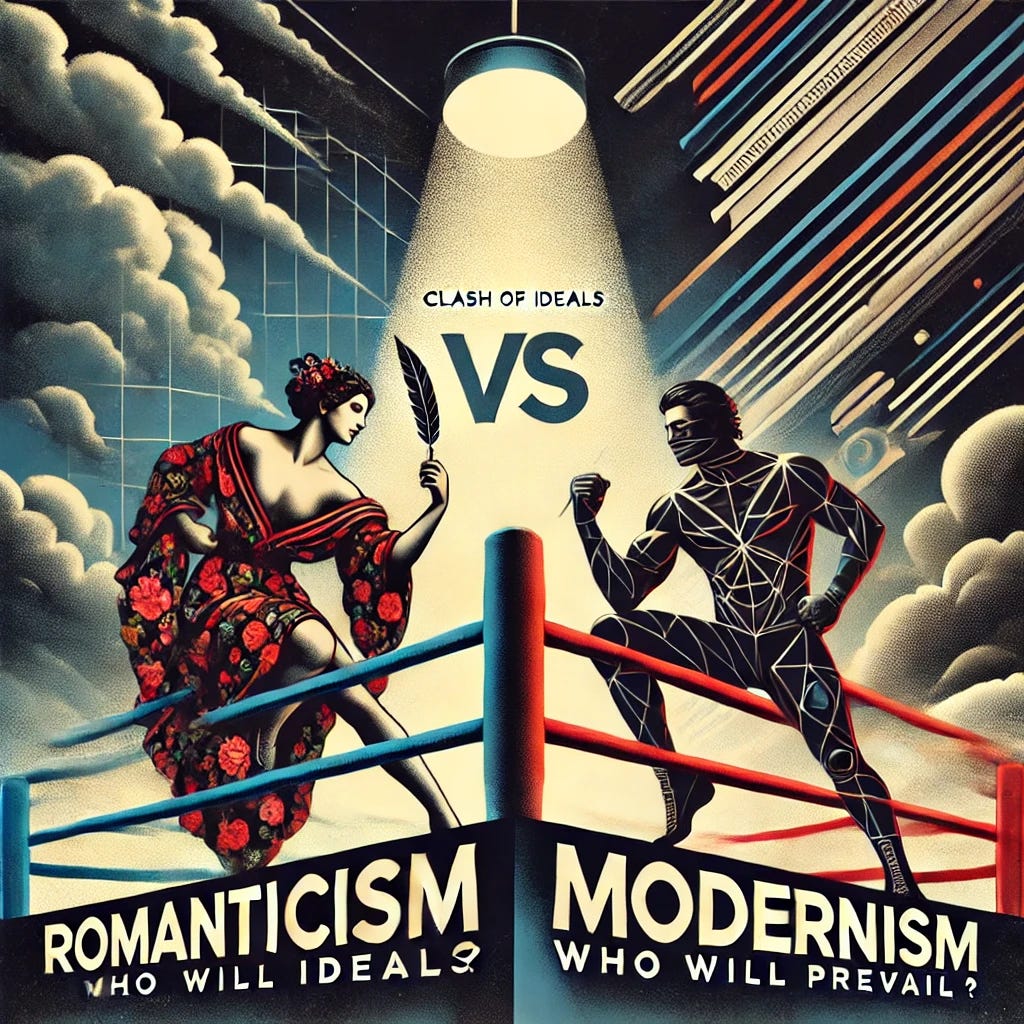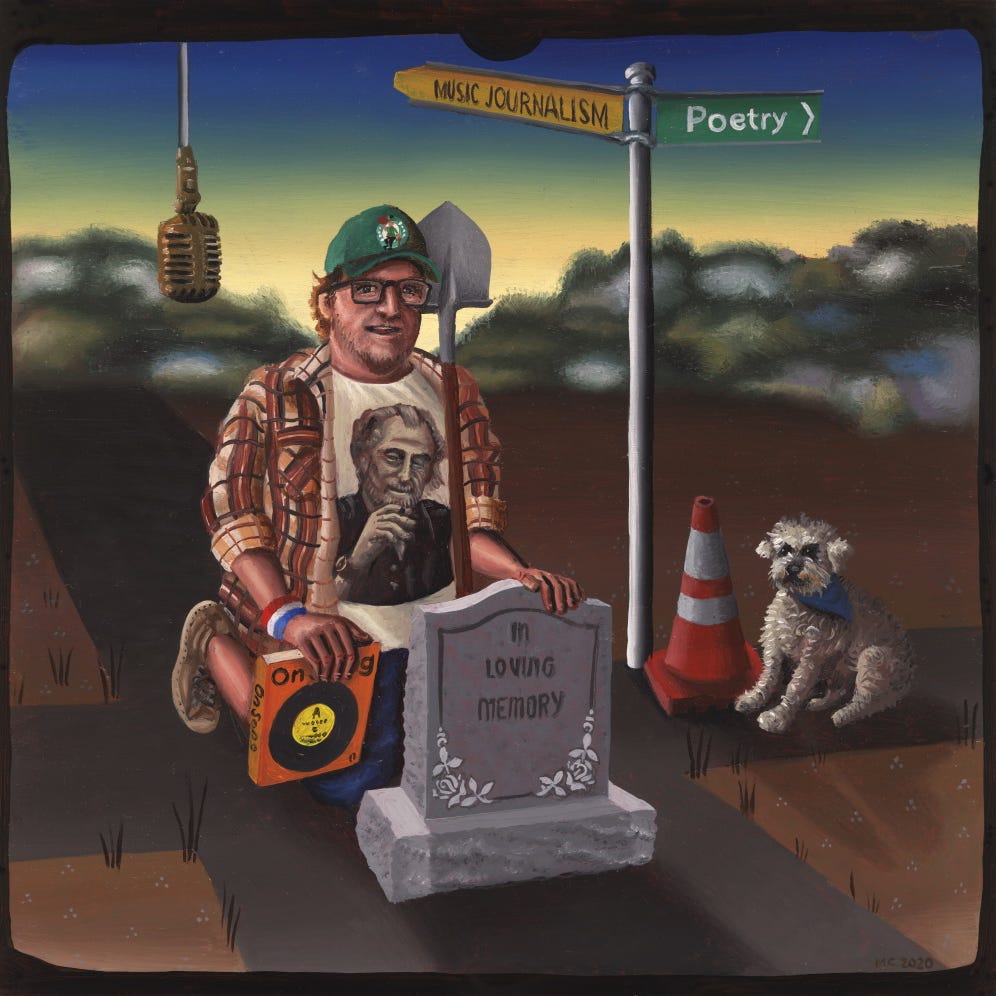What is the Relationship Between Modernism and Romanticism?
Notes towards an essay examining the relationship between Modernism and Romanticism in literature
In the same way that Romanticism was a reaction to Enlightenment, Modernism was a reaction to Romanticism. Modernism sought to move past the perceived ‘beauty’ of the romantics, and the ideal structuring of stories that were often neatly tied up with a bow at the end. But when something is working in reaction to the movement ahead of it there is of course still a relation.
Take Faulkner’s The Sound and The Fury. Its themes of family legacy, memory, and loss in particular, are broadly echoing of some of Romanticism’s tenets. However, there’s a shift in the tone which is crucial. Modernism was largely unsentimental in that regard, and it was writers like Faulkner (and Hemingway) that really broke down the wall of sentimentality, opting for harsher ways of telling the story. The story’s title an echo of Shakespeare (Macbeth: “a tale told by an indict, full of sound and fury, signifying nothing” ) being the clue that we’re in for something tougher, more tragic, less ‘ideal’ than a lot of Romanticism’s more emotionally flowing narratives which opted for a form of transcendence, incorporating change or developments across a group setting. In Modernism, particularly from its male writers, we felt the shift towards tougher, more individually focussed narratives. Hemingways’ The Old Man And The Sea pits its title’s character against its title’s location. That is it. Was it a metaphor for the writer feeling adrift, alone, and at sea? Returning to the early promise of his work? Most likely, but there is nothing close to a group catharsis here, it is entirely in contrast to the Romanticism — but that doesn’t mean there aren’t parallels. If Romanticism is about the individual’s subjective experience, then we can see that in The Old Man and The Sea, it’s just that the battle is existential, in line with Modernism’s tenets. There is symbolism in The Old Man and the Sea too (the marlin) it’s just that it’s more pared-back than the way symbolism was treated in Romanticism — again, that is Modernism’s constant comparison. By being different from something, or being a reaction to something, there is still a conscious alignment in that sense.
Ezra Pound’s Imagism is of course another example of a direct reaction to Romanticism. His two-line poem, In A Station At The Metro is about as removed as one can get from the Romantic poets.
The apparition of these faces in the crowd:
Petals on a wet, black bough
It is one of the best-known ‘short’ poems in the modern world, and so much has been written about it — and not just by academics. It is beguiling, and elicits such an emotional response. The poem speaks of a fleeting moment — it is ships in the night, it is the ‘sliding doors’ moment of connection almost being there, and then lost. This might have been a pared-back reaction to the Romantic poets, but there is a ‘romanticism’ to this poem also. It is absolutely rooted in Modernism, it embodies the principles, but through that, and in reaction to the Romanticism that came before it, it is also still aligned. This is the power of working in reaction to something. Romanticism was concerned with finding harmony between humanity and nature, in two lines and in one sentence Pound arguably achieves a version of that — he is all but imagining or presenting a photosynthesis of human faces transitioning to the flower petals on a branch; a cutaway scene at the train station, in a fragmentary moment that ultimate harmony of Romanticism is achieved, it just happens to be via the tools of Modernism.
And this, through Faulkner, Pound, Hemingway, and then on through the writers they influenced (Bukowski, Carver, Cheever) might be one of the great examples of how Romanticism did indeed hold an alluring pull over Modernism even in its reaction. For isn’t it true that in the subjective takes of the Modernist writers they were, as men alone in these instances, whether Pound as observer, or Hemingway as the author-avatar in The Old Man And The Sea, romanticising themselves essentially? Such introspection was indeed a hallmark of Romanticism, it’s just that in the hands of the Modernists, the introspection was also obfuscated. Romanticism might have been a reaction to Enlightenment, but in the end many of the Romantic works sought to achieve their own form of enlightenment in denouement. They went about it differently from the form that preceded. And so it is with Modernism’s reaction to Romanticism — the individual is often the focus, the outcome isn’t always, or often, happy or ideal, but the deep exploration of the human psyche, and the front and centring of the subjective experience is still in line with some of Romanticism’s frame-working if not its spiritual outcomes.







I agree with what you wrote, it's nicely expressed too. I would add that Modernism was about about experimenting with new forms, and engaging with modern life, as opposed to Romanticism's tendency to nostalgia (although modernism was also about intertextuality, eg quoting older works, but this was done in a collage fashion, often confusing the reader eg The Wasteland). Modernism was quite consciously difficult - their argument was that art had to reflect the complexity of modern life, and if that meant being obscure then so be it. But this meant it also had a tendency to towards elitism, the avant garde etc. At the other extreme, it engaged with new technologies to produce work that was for a mass audience, film for example. For Walter Benjamin, the technological reproducibility of art in modernism meant the possibility of a whole new reaction to art - the destruction of its aura through reproduction - according to Benjamin this was a good thing, as it would democratise art.
There are arguments that Shakespeare himself was the first modernist and given his continued relevance, I can see it. It’s always a pleasure to wallow in Keats but it feels more like highbrow escapism these days.